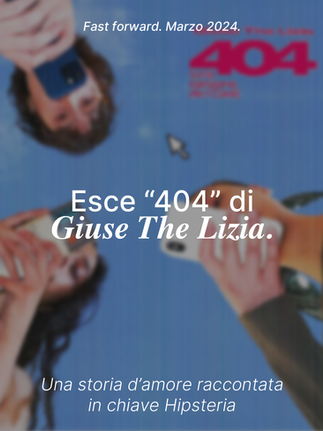Giuse The Lizia: I Cani and the Italian Indie: A Generational Musical Legacy
- Valentina Bonin

- Apr 9, 2025
- 4 min read
Updated: Apr 25, 2025
June 3, 2011 as a Turning Point in Italian Indie
There is a turning point in Italian indie music dated June 3, 2011. It’s made of infamous guards, dinners at Pigneto, stickers on helmets, and ostentatious, smoky melancholy. It’s the story of a generation of teenagers, the last ones born in an analog world, who discover and flirt with the digital realm, surviving as they can through a social and emotional revolution that would soon overwhelm us. This story is encapsulated in the nine tracks (+ two instrumentals) of the surprising debut album of I Cani.
ITPOP: The Birth of a New Italian Music Scene
Nine photographs, taken by Niccolò Contessa at unique and unforgettable moments in his life and our country, form the raw material for a language that would be developed in the following years by the scene we now call ITPOP. Photos that pretend to be on film but were made with the first iPhones, where the bourgeois, the youth, the fascists, the couples, and the pariolini (upper-class Romans) appear: exaggerated characters full of humor and the complexities of a twenty-year-old moving through a Rome that has now disappeared (has it really disappeared, or have we just grown up?).
The Impact of I Cani: Listen to Understand
Articles (certainly not this one) or even novels are not needed to highlight the immediate impact and decade-long legacy of I Cani’s project on our musical DNA (but do read them anyway, my recommendation: Ti Prego Non Ridurmi ad Icona by Stefano Pomes). It’s enough to listen. Listening, I discovered echoes where I didn’t expect (any longer) to find them. For example, in 404 (a song by I Cani) by Giuse The Lizia, the real protagonist of this focus.
Giuse The Lizia and the Return of Generational Indie Pop
A brief recap if you don’t know him: He’s 23 years old and has been causing a stir for the past four years. He writes, sings, and has fully positioned himself as one of the loudest voices of Gen Z (my recommendation: the EP Lalalacrime, and if you like it, go ahead and explore the rest). Personally, I don’t appreciate everything and often find his writing distant from my tastes (aka, I’m old), but in his most recent album INTERNET, I found a decent number of tracks that I really liked.
404: Between Homage and Personal Style
Let’s return to the track released at the end of March: 404 tells the arc of a love story, and it does so in a style of Hipsteria, with references so explicit and close to the style of NC (Niccolò Contessa) that, I must admit, I was taken aback at first, triggering the nerve reserved for defining the line between parody and tribute. But I encourage you to listen more than once: in some details, the refined craftsmanship done by Giuse in trying to wear the shoes of our (a task I wouldn’t wish on anyone) becomes clear. He does it well, in an interesting, respectful, and most importantly deliberate way, as I confirmed when I heard him refer to I Cani as “my big love from high school, whom I’ve always admired for the way they told the story of their generation.”
Generations Compared: The Phone as a Symbol of Continuity
It’s surprising to calculate the years of difference between the two, so let’s not do that. Couples give each other gifts, go to concerts, and end things on Facebook. Fifteen years later, Anna and Marco meet at Campari and break up on an iPhone, and perhaps it’s precisely the iPhone that embodies the vibe of 404—a transitional object, always different but the same, that bridges the two generations. The first generation, suspicious of its arrival, discovers they have the internet in their pockets, learns to desire it, and never lets go. The second, to whom the phone no longer fits in their pocket, exhausted, frustrated, anxious, goes back out, buys vinyl records, and embraces vintage fashion.
A Successful Tribute to Early 2010s Indie Pop
Depending on how you look at it, 404 might seem like theft or a remake—I think it’s both, like perhaps any love song, and that’s why it works. A new story that feels familiar, normal, and made of simple words, and in telling it, Giuse undeniably had fun immersing himself in the POV of Contessa (more or less aware that he was heading into the territory of nostalgic fanboys like myself, ready to criticize with guns blazing; for the courage alone, he deserves the streams).
Conclusion: 404 as a Bridge Between Two Musical Eras
The production is masterfully crafted in the canonical style of the 2010s: the same synthetic leads, quantized drums, and syncopated bass—a well-executed historical falsehood.
A track that, live, will make people dance and (I hope) forget the vanity of generational comparisons: let’s try to feel brilliant reading David Foster Wallace or listening to Stefano Nazzi, only to discover that we’re not, and that’s okay.

















Comments